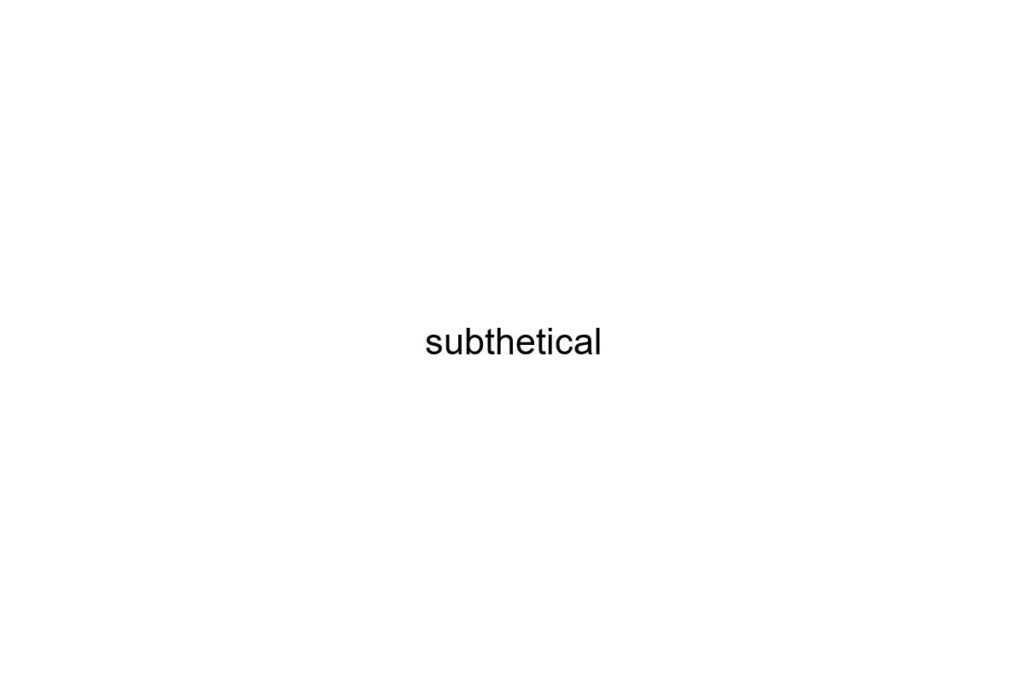When I first stumbled upon the term “subthetical,” I found myself intrigued by its layered meaning and potential applications. This word, often overlooked, carries significant weight in discussions about philosophy and logic. It invites us to explore the nuances that lie beneath the surface of our everyday conversations and thought processes.
Understanding subthetical concepts can deepen our comprehension of arguments and enhance our critical thinking skills. Whether you’re a student, a professional, or just a curious mind, grasping the essence of subthetical thinking can enrich your analytical abilities. Join me as we dive into this fascinating topic and uncover the power of what lies beneath the obvious.
Overview of Subthetical
Subthetical concepts play a critical role in philosophy and logic by underlining the assumptions that influence arguments. These ideas focus on the implied meanings behind statements rather than overt expressions. Identifying subthetical elements enhances my ability to dissect complex discussions, leading to more effective communication and analysis.
Subthetical analysis begins with recognizing underlying assumptions. For example, when someone states, “If it rains, the picnic will be canceled,” the implication is that rain directly impacts the plan. Recognizing this connection allows for a deeper inquiry into the cause-and-effect relationship.
Additionally, subthetical frameworks assist in evaluating the validity of arguments. By examining what is taken for granted, I can better assess the strength of a claim. Engaging with these subtleties fosters improved critical thinking skills, enabling me to construct well-reasoned arguments and anticipate counterarguments.
In practical applications, subthetical reasoning aids in various fields, including law, literature, and science. For instance, in legal debates, understanding the subthetical context of testimonies can uncover biases and strengthen case arguments. This capability enhances my analytical skills across disciplines.
Key Characteristics of Subthetical
Subthetical concepts carry significant weight in understanding arguments and underlying assumptions. By exploring their nuances, I can enhance my critical thinking and analytical skills.
Definition and Meaning
Subthetical refers to the implied meanings and assumptions that shape arguments. It underlines the deeper layers of communication, which often go unnoticed. The subthetical framework reveals what’s taken for granted in discussions, enabling me to analyze the validity of various claims. By recognizing subthetical layers, comprehension of debates grows, leading to more informed conclusions.
Examples in Literature and Art
Subthetical elements frequently appear in literature and art, enriching the interpretation of themes and characters. For instance, in George Orwell’s “1984,” the concept of doublethink acts as a subthetical layer, exposing the manipulation of truth by totalitarian regimes. Similarly, in paintings like Edward Hopper’s “Nighthawks,” the loneliness of modern life serves as a subtle commentary on societal disconnects. By examining these works through a subthetical lens, I can uncover deeper meanings and critiques embedded within creative expressions.
Significance of Subthetical
Subthetical concepts play a crucial role in deepening our understanding of arguments and improving analytical capabilities. By recognizing the layers of meaning embedded in discourse, I can enhance my critical thinking and comprehension.
Impact on Interpretation
Subthetical analysis directly influences how I interpret texts, discussions, and arguments. It reveals hidden assumptions and implied meanings that often go unnoticed. For instance, analyzing a statement like “The economy is improving” can lead me to question the metrics that define “improvement.” This scrutiny encourages a more nuanced understanding of underlying motivations, biases, and contextual nuances, enhancing my interpretive skills.
Relationship with Other Concepts
Subthetical reasoning intersects with concepts such as context, implication, and critical thinking. Understanding subthetical frameworks allows me to identify how context shapes arguments and enhances meanings. Recognizing implications helps in discerning the significance of what is left unsaid, guiding me to evaluate the strength and validity of arguments effectively. By integrating these concepts, I can foster a holistic analysis of discussions across various fields, including ethics, rhetoric, and everyday communication.
Critiques and Counterarguments
Critiques of subthetical reasoning often focus on its perceived complexity. Some critics argue that the analysis may lead to overinterpretation of texts or arguments. They suggest that pursuing subthetical meanings might convolute discussions, making them difficult to follow. Clear communication can suffer when analysts prioritize implied meanings over explicit statements.
Counterarguments emphasize the necessity of subthetical analysis for comprehensive understanding. Critics may overlook that recognizing hidden assumptions clarifies arguments rather than muddles them. The nuances uncovered through subthetical frameworks enable vital insights into biases and motivations, enriching the quality of discourse.
Another critique centers around the potential for subjectivity. Detractors claim that differing interpretations of subthetical implications could result in varied conclusions, leading to inconsistency in arguments. This perspective assumes that universal interpretations exist, which fails to acknowledge the diversity of human experience and understanding.
Counterarguments indicate that subjectivity in interpretation is inherent in all forms of analysis. Subthetical reasoning encourages awareness of multiple viewpoints, fostering constructive dialogue. Embracing this subjectivity opens avenues for richer discussions rather than limiting them.
Some critics point out that subthetical reasoning could distract from direct argumentation. They argue that focusing on underlying assumptions might divert attention from addressing the primary point of contention. This perspective suggests that a clear, straightforward approach prevails in most discussions.
Counterarguments assert that direct arguments alone may neglect essential context. Subthetical analysis provides necessary background that informs and strengthens direct assertions. Engaging with subthetical aspects can bolster argumentative rigor by addressing foundational beliefs that drive reasoning.
Overall, while critiques of subthetical reasoning underscore valid concerns, counterarguments highlight its value in enhancing critical thinking. Addressing these criticisms encourages more nuanced exploration of arguments, ultimately leading to better comprehension and communication in various contexts.
Conclusion
Exploring subthetical concepts has opened my eyes to the layers of meaning that shape our arguments and conversations. By recognizing the underlying assumptions in discussions I engage in, I can analyze and communicate more effectively. This deeper understanding not only sharpens my critical thinking skills but also enriches my interpretations across various fields.
While some may argue that subthetical reasoning complicates dialogue, I believe it actually clarifies and strengthens arguments. Embracing this analytical framework allows me to appreciate different perspectives and fosters a more nuanced approach to discourse. Ultimately, engaging with subthetical elements enhances my ability to navigate complex discussions and contributes to more informed conclusions.
Frequently Asked Questions
What does “subthetical” mean?
Subthetical refers to the underlying assumptions and implied meanings in arguments and conversations. It explores the subtle connections that influence thought processes and communication.
Why is understanding subthetical concepts important?
Understanding subthetical concepts enhances critical thinking and analytical skills. It helps individuals recognize hidden assumptions, enabling better comprehension of arguments and discussions.
How can subthetical analysis improve communication?
By identifying the underlying meanings in statements, subthetical analysis clarifies arguments and uncovers biases, leading to more informed and effective communication.
In which fields is subthetical reasoning applicable?
Subthetical reasoning is relevant in various fields, including law, literature, and science, where recognizing implied meanings can strengthen arguments and reveal biases.
What are some critiques of subthetical reasoning?
Critiques often focus on its perceived complexity and the risk of overinterpretation, potentially muddling discussions. However, counterarguments suggest that it can clarify nuances and enhance analysis.
How can subthetical analysis affect interpretation in literature?
In literature, subthetical analysis can reveal deeper meanings and critiques, enriching understanding by uncovering hidden assumptions within texts and their contexts.
How does subthetical reasoning relate to subjectivity in discussion?
While some critics claim it may lead to inconsistent conclusions due to subjectivity, proponents argue that engaging with multiple perspectives fosters constructive dialogue and awareness.
Can subthetical reasoning detract from direct argumentation?
While critics argue it distracts from direct points, supporters maintain that subthetical analysis provides necessary context, ultimately strengthening direct arguments and enhancing clarity.


